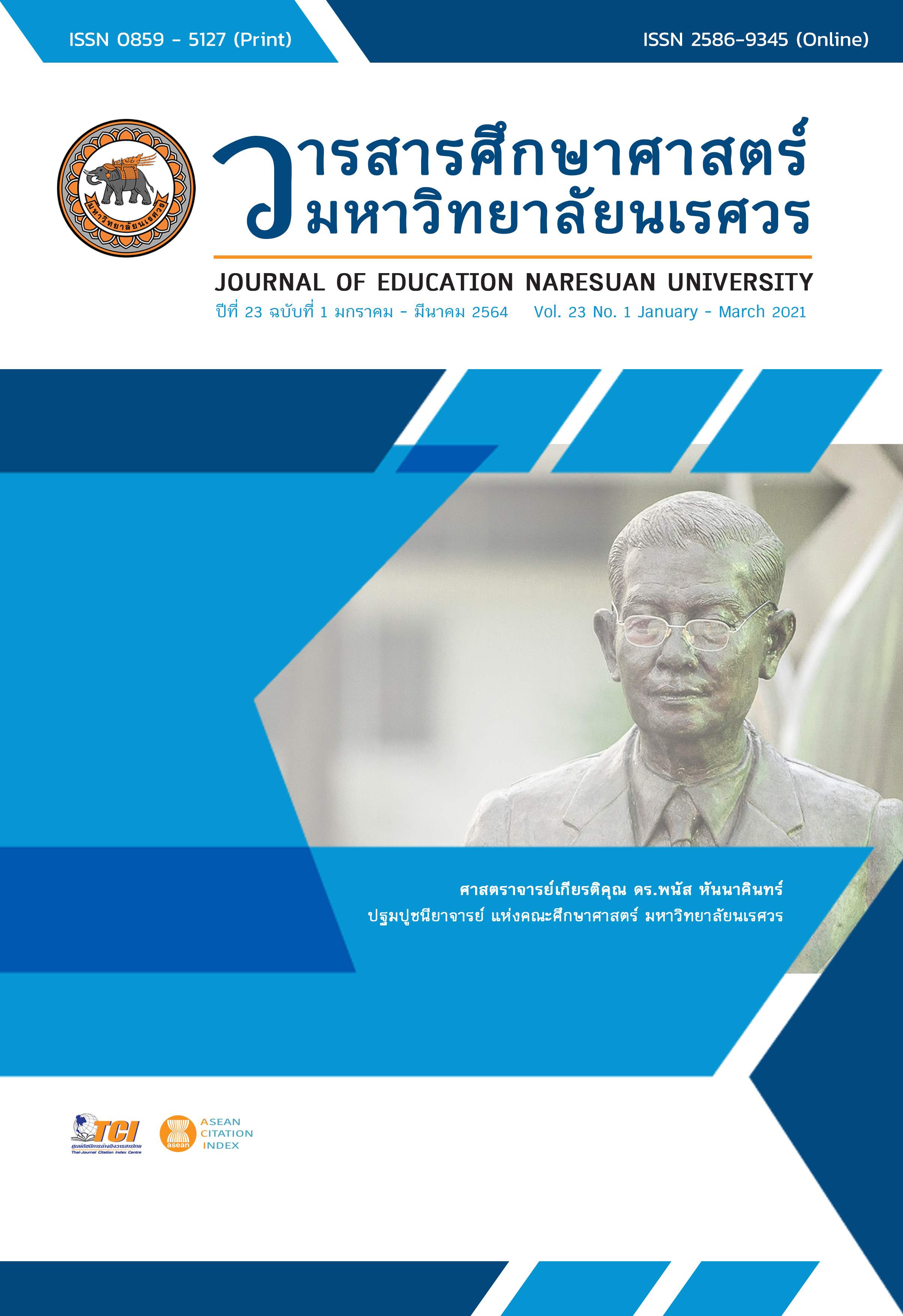THE DEVELOPMENT OF INSTRUCTIONAL MODEL FOR ROBOTICS CONTROL PROGRAMMING USING TEAM-GAMES-TOURNAMENT การพัฒนารูปแบบการเรียนการสอนการเขียนโปรแกรมบังคับหุ่นยนต์ ด้วยเทคนิคเกมการแข่งขันเป็นทีม
Main Article Content
Abstract
The objectives of this research were 1) to develop the instructional model for robotic control programming using Team-Games-Tournament (TGT), 2) to compare learning achievement before and after learning using TGT, and 3) to study the students’ satisfaction towards the instructional model. In this study, the researcher developed the instructional model, evaluated the model by experts and tested with 22 samples who were students of Computer Majored at Naresuan University, selected by purposive sampling method. For data analysis, t-test dependent sample was employed to delineate and compare the pre-learning and post-learning achievement. The result of this research revealed that; 1) the model of instructional for robotic control programming using TGT consisted of six steps, as follows: gaining attention, instructional model, conducting learning activities, preparing for the competition, conducting competition and summarizing and evaluating phase, 2) in the comparison of learning achievement before and after learning of the samples, the results showed that post-learning scores of the samples were higher than pre-learning’s at .01 level of significance, and 3) the samples agreed that the instructional model for robotics control programing using TGT was in high level of satisfaction.
Article Details
The owner of the article does not copy or violate any of its copyright. If any copyright infringement occurs or prosecution, in any case, the Editorial Board is not involved in all the rights to the owner of the article to be performed.
References
Jaitiang, A. (2010). Principles of teaching (5th ed.). Bangkok: OS Printing House. [in Thai]
Joyrung, N., Chauvatcharin, N., & Sirisawad, C. (2018). A study of biology achievement and group process skills of a special scientific course 10th grade students by using cooperative learning TGT technique. Journal of Education Naresuan University, 20(2), 75-88. [in Thai]
Khammani, T. (2014). Teaching science: Knowledge for effective learning management (18th ed.). Bangkok: Chulalongkorn University Press. [in Thai]
Lowriendee, W. (2004). Learning management techniques for professional teachers. Nakhon Pathom: Silpakorn University. [in Thai]
Lueksompoth, P. (2007). A comparison of learning achievement in mathematics, attitudes towards learning mathematics, and interaction among students between the use of cooperative learning (teams-games-tournaments) and conventional approach for mathayomsuksa 1 students (Master thesis). Phra Nakhon Si Ayutthaya: Phranakhon Si Ayutthaya Rajabhat University. [in Thai]
Nakasan, N., & Nakasan, C. (2016). Game: Innovation for creative education. Romphruek Journal Krirk University, 34(3), 159-182. [in Thai]
Natakuatoong, O. (2000). Instructional technology unit 1-8. Nonthaburi: Sukhothai Thammathirat Open University. [in Thai]
Sansuwan, W. (2008). Development of web-based cooperative learning using teams-games-tournament technique for science curriculum of mattayomsuksa II. Bangkok: King Mongkut's University of Technology North Bangkok. [in Thai]
Sintapanon, S., Sukying, F., Veerakiatsunthorn, J., & Naparat, P. (2011). Teaching methods according to educational reform to improve the quality of youth. Bangkok: 9119 Printing Techniques. [in Thai]
Suwantada, N. (2016). The effect of mathematic learning activities with a teams-games-tournaments (TGT) technique: A case study of pre-calculus project 2015. Panyapiwat Journal, 8(2), 144-152. [in Thai]
Thai Youth Encyclopedia. (1993). Robot. Retrieved from http://kanchanapisek.or.th [in Thai]
Wangdeeson, A., Prasantree, T., & Anantarak, M. (2014). A comparison of learning achievements of mathayomsuksa 5 students in learning the science substance group entitled ‘calculating a substance quantity in a chemical reaction’ through instructional using TGT learning technique versus STAD learning technique. Nakhon Phanom University Journal, 4(2), 80-87. [in Thai]


